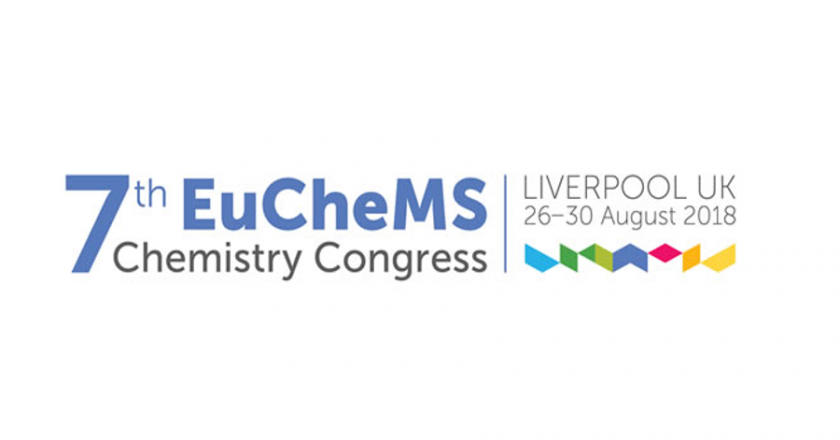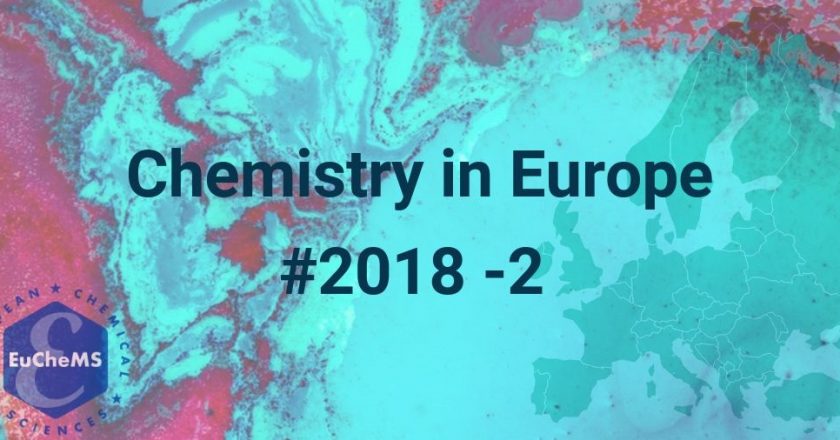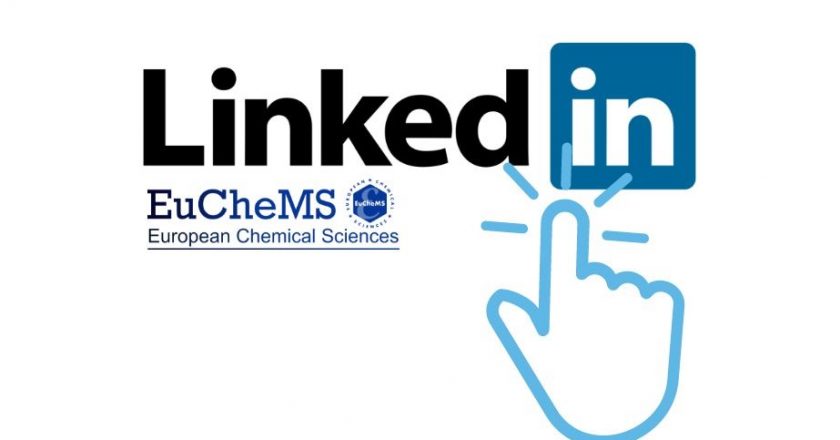26 – 30 August 2018
Liverpool, UK
Website: https://www.euchems2018.org/


26 – 30 August 2018
Liverpool, UK
Website: https://www.euchems2018.org/

Keep an eye out for the upcoming Chemistry in Europe newsletter – with highlights including: the editorial, a look at FP9, the march for Science in Germany, and news from the Young Chemists! Not signed up yet? Click here!

EuCheMS is happy to announce that a policy workshop on Parkinson’s disease will be held at the European Parliament under the chairmanship of MEP Pavel Poc, co-organised with the EFMC. The workshop will seek to provide a detailed and sound understanding of Parkinson’s disease, as well as a look into possible treatments and how the EU can help boost such research. It will moreover look at the recent controversy surrounding the European Commission’s decision to discount the European Food Safety Agency’s (EFSA) statement on the dangers of the diquat herbicide – the latter which could be a cause of Parkinson’s disease. Dates soon to be announced, so keep an eye on this space!
5 May 2018
Brussels, Belgium
Website: https://bit.ly/2Hdg8JB
20 – 22 April 2018
Prague, Czech Republic
Website: http://old.vscht.cz/lam/ECTN/GAPrague.htm
27 – 29 April 2018
Brussels, Belgium
Website: https://bit.ly/2Jy6nGP
17 – 26 June
Ghent, Belgium
Website: http://www.isiem2018.org/
10 – 14 June
Gargnano, Italy
Website: http://corbellasummerschool.unimi.it/
4 – 7 June
Prague, Czech Republic
Website: http://www.iis-prague2018.cz/
13 – 17 May
Rome, Italy
Website: https://rome.setac.org/
10 – 12 May 2018
Hannover, Germany
Website: http://bit.ly/2HmGIif
2 – 4 May 2018
Porto, Portugal
Website: https://www.fc.up.pt/spe2018/
Deadline: 31 May 2018
Website: https://bit.ly/2FTLVC4
Deadline: 30 April 2018
Website: http://www.euchems.eu/new-award-euchems-historical-landmarks/
Deadline: see projects list here
Website: http://www.efsa.europa.eu/en/calls/art36grants
Deadline: 26 April 2018
Website: http://bit.ly/2CMDUbB
The European University Association has opened the call for contributions to the Fourth EUA Funding Forum. The event will be hosted by Ramon Llull University on 18 and 19 October in Spain. Contributions are sought from researchers focusing on higher education and research funding, and should relate to university funding and management. Take a closer look here.
Deadline: 30 April 2018
As part of the European Commission proposal for the creation of a European Education Area, a Council Recommendation on promoting the automatic mutual recognition of higher education and upper secondary education qualifications and study periods within the EU has been put forward. The objective is to have Member States put into place procedures that will simplify and improve mobility of students, teachers and research through automatic mutual recognition of qualifications.
Share your views!
Deadline: 17 April 2018
The risk of outbreaks of highly infectious diseases will continue to increase and hit ever wider areas as mobility, urbanisation and the environment continue to change. The EU is currently looking at how to better counter these threats, and coordinate research and crisis management across the Member States. Two mutually reinforcing capabilities have been put forward: ‘the EU capacity for public health, food safety and animal health preparedness and response to those threats, and the EU capacity for targeted and coordination research and innovation to deliver effectively and timely with successful therapeutic and prophylactic countermeasures, including new medicines’. Your scientific and expert feedback on the Commission’s Communication is wanted – don’t disappoint them!
Deadline: 23 April 2018
On 20-21 March, the European Commission hosted a conference to identify the cross-cutting actions it, and stakeholders, could take, ‘to maximise the societal benefits of nuclear and radiation technologies, whilst providing high standards of quality and safety to European citizens’. The conference, with keynote speakers such as Climate Action and Energy Commissioner Miguel Arias Cañete, Health and Food Safety Commissioner Vytenis Andriukaitis, and Director General of the International Atomic Energy Agency (IAEA) Yukiya Amano, sought to facilitate discussions between stakeholders, experts and institutions with the aim of contributing to the Commission’s general legislative work on this subject. More info here.
For more information on EuCheMS’ work on the subject, visit our Division of Nuclear and Radiochemistry page.
A high-level Horizon 2020 conference organised by the European Commission spotlighted the latest innovations in the field of cultural heritage supported by EU funding instruments. The conference demonstrated the crucial link between preserving cultural heritage and scientific research and innovation, whether in the form of engineering and structural repairs, 3D laser scanning, or neutron resonance analysis for archaeological applications.
But chemistry and Cultural Heritage are also linked in other ways. Chemistry has been an integral part of Europe’s cultural makeup, and for this reason, EuCheMS decided to set up its Historical Landmarks Programme, which will reinforce the sense of belonging of European chemists and showcase to the public the role chemistry plays in our cultural heritage. Know a historical landmark that ought to be better recognised for its links to chemistry? You have two weeks left to submit your proposal! You can read the guidelines for the award here.
Interested in Chemistry and Cultural Heritage? Join the 5th International Congress Chemistry and Cultural Heritage in Bucharest, Romania on 3 – 7 July 2018!
A study by the Swiss Federal Institute of Aquatic Science and Technology, ETH Zurich and the University of Illinois, found that ‘’potentially pathogenic bacteria’’ could be found inside rubber ducks, The Guardian reports. The study points to low quality polymers in the plastic ducks as providing nutrients for the bacteria, of which Legionella and Pseudomonas aeruginosa were also found – posing a serious risk to children’s health.
With World Health Day, held under the auspices of the World Health Organisation (WHO) just a few days ago, we can take stock of the multitude of areas in which chemistry is playing a vital role in improving health conditions. EuCheMS took the opportunity to focus once more on the role of Trans Fatty Acids in our diet as well as the continued danger of antibiotic resistance. For more health-related issues, keep an eye out for the EuCheMS-EFMC session at the EFMC congress in Ljubljana (in September) and check out the 7th EuCheMS Chemistry Congress programme! 
A study published in Nature by the European Molecular Biology Laboratory in Heidelberg has revealed a phenomenon by which gut bacteria can become resistant to antibiotics through contact with drugs not intended to harm bacteria. The study demonstrated that drugs such as omeprazole, antihistamines, painkillers and blood-pressure pills, could induce antibiotic resistance. The gut bacteria seem to therefore employ a similar defence mechanism with a wide range of drugs. You can read the Economist’s article here.
The issue of antimicrobial resistance (that is, the ability of microorganisms to withstand attack by antimicrobial drugs such as antibiotics) has been greatly focused on by EuCheMS. The dangers posed to public health that this resistance causes is the reason why we have included it in one of our ‘Missions’ for the Future Framework Programme 9. EuCheMS also held a joint European Parliament STOA and EFMC workshop on Solving Antibiotic Resistance, chaired by MEP Paul Rübig. For more on our position, take a look at our answer to the European Commission’s Public Consultation on antimicrobial resistance.
On 22 March, a public hearing organised by the European Parliament’s Environment Committee and the Petitions Committee looked at the impact of endocrine disruptors on public health and the environment. Endocrine disruptors, usually found in pesticides, metals, additives and contaminants in food, are chemicals that can interfere with our endocrine and hormonal systems and which can cause cancerous tumours, birth defects and other disorders (see the World Health Organisation’s info page). A recent high number of petitions on the subject led to the Parliament’s decision to hold the hearing and discuss the EU’s regulatory actions, as well as what scientists are currently saying on the subject. In October 2017, the Parliament had blocked plans proposed by the European Commission to exempt some pesticides from being identified as endocrine disruptors.
You must be logged in to post a comment.